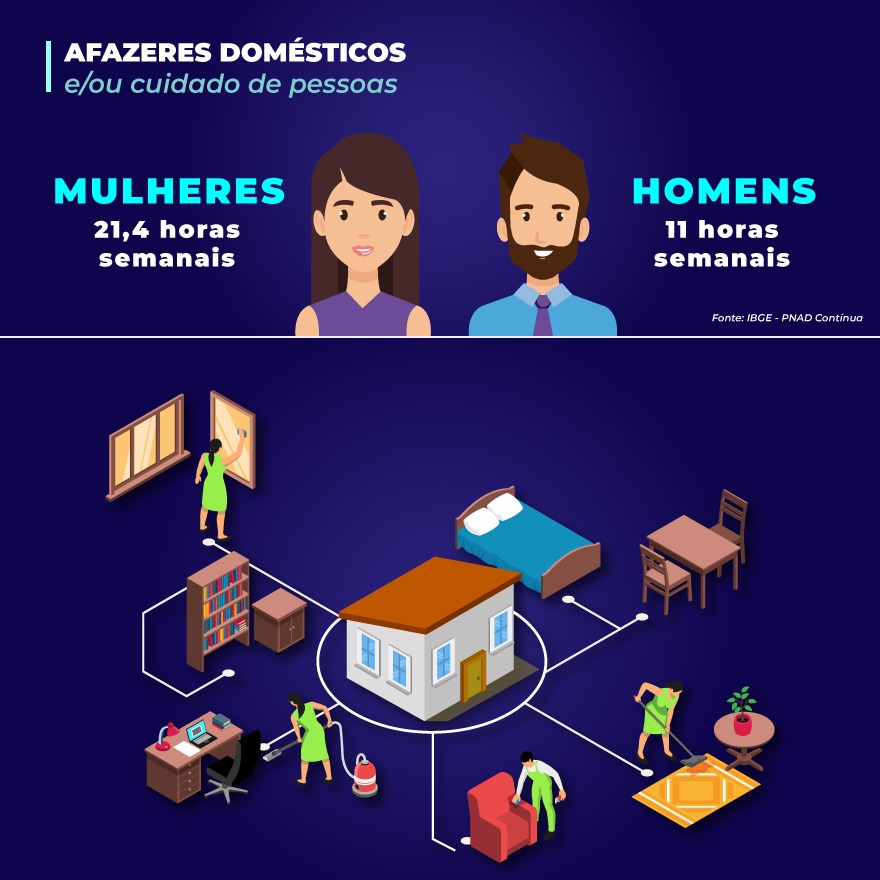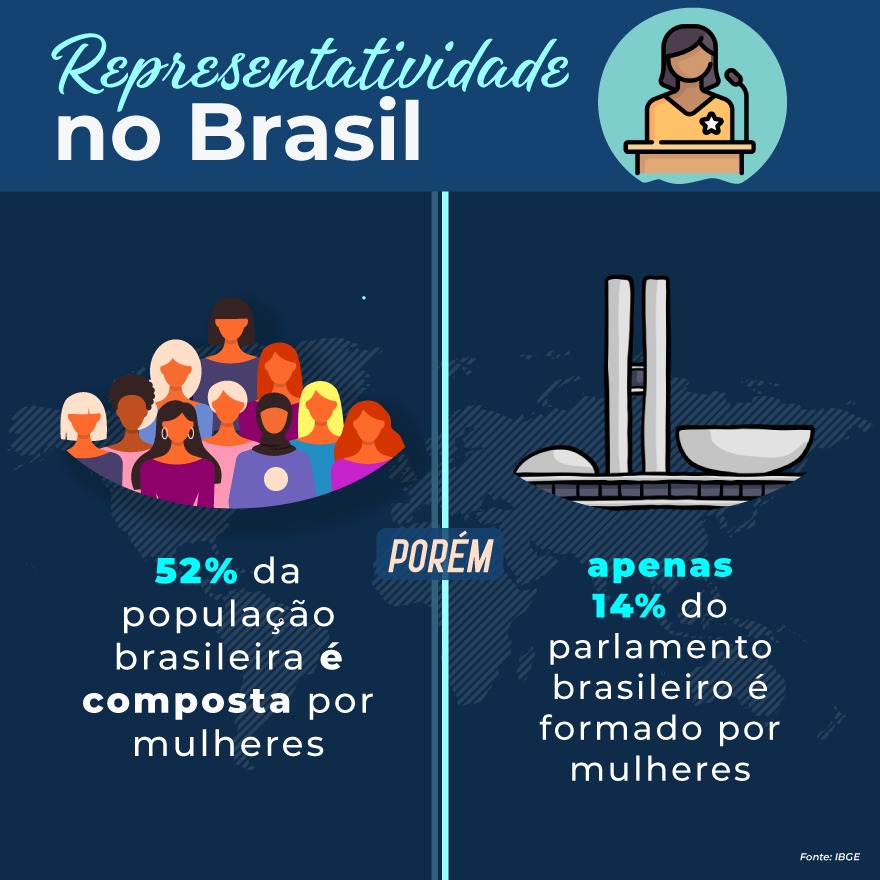“My baby is asleep now, I’ll be able to answer you.” It was like this, at 9pm, that Bruna Borges, finance assistant at PAHO (Pan American Health Organization) and student of the Masters in Public Administration at IDP, began our conversation. Before that, she had already warned: her husband was working, she has a 2-year-old son and was busy.
We are, always.
According to IBGE, women dedicate 10.4 hours more per week than men to household chores or caring for people. The information comes from the latest Continuous PNAD (Continuous National Household Sample Survey) and shows that men dedicate 11 hours a week to these activities, while, among women, this number rises to 21.4 hours a week - almost double.

In times of pandemic, “what was already precarious became much worse”, highlights Renata Malheiros, coordinator of Sebrae Delas, a project of the Brazilian Micro and Small Business Support Service (Sebrae) that supports companies led by women. With children at home due to school closures and the elderly, as they are at risk groups, needing more care, women are even more burdened, since, “culturally, these tasks have always fallen more on them”, she explains.
The result? Women dedicate 17% fewer hours to companies than men, according to research by Sebrae. “And there are 24 hours in a day for everyone. What we do with these 24 hours is what makes a difference in our lives . But, how am I going to dedicate myself to my business if, culturally, I am overloaded with domestic tasks and taking care of people?”, asks Renata.
Culture is above us all
“Of course women are everywhere. But I want to see women in leadership positions, I want to see women in charge, I want to see women in positions of power. Women working have always had, now, women in charge, do they? Why isn't there? What are the invisible barriers?” It is with this question that Renata Malheiros brings up the difficulties of a culture that has long put women at a disadvantage in several social aspects.
Since we were children, we are all men and women, educated according to what society expects from boys and girls - expectations that are also the result of culture. “It's 'men don't cry', it's 'that's not a way for girls to talk', it's saying that girls aren't good at math, for example”, he explains.
The experience of entering a toy store, for example, illustrates how boys and girls socialize differently. If, when you look for a toy for girls, the options offered are little houses, pots, brooms and dolls, “ you teach them how to care, how to cook, how to give love. And that's excellent! The problem is teaching this only to girls. I need a grown man who does this too ,” he explains.
The same goes for boys' toys. By offering cars, board games, building blocks and superheroes, we teach “a sense of abstraction, speed, proactivity, logical reasoning, and how to act with courage. Excellent too! The problem is teaching this only to boys. I need women to have these skills too ”, explains Renata.
It is from there that so-called limiting beliefs or unconscious biases , which reverberate in the behavior of men and women as adults. “This is the crux of the matter: boys and girls receive these beliefs from our own upbringing, from our own culture. Everything we learn in childhood is very ingrained”, points out Renata.
These limiting beliefs, at the same time as they are a problem, bring with them the answer: because it is a culturally constructed issue, it is subject to change. “Most of our behavior, who we are, what we do and how we do it, has been taught. And, if it was taught, we can change. ”, emphasizes Renata.
Renata Malheiros brings all her experience with female entrepreneurship and promoting diversity in leadership positions to the Women and Leadership . The classes are part of IDP's OpenClass project, which offers quick, free, certified online courses.

Diversity and female leadership
One of the (United Nations) Sustainable Development Goals
“Public space has historically been destined for men, and this includes, notably, decision-making arenas; when women try to access it, they can be refuted because the stereotype that surrounds leadership positions is that of men”, explains Carolina Costa, professor of the IDP Law Course and lawyer.
“When you think about political representation, there is still a long way to go for women to occupy this space of power”, says Renata Malheiros. According to IBGE, despite 52% of the Brazilian population being women, in the Chamber of Deputies and the Federal Senate, only 14% of the seats are occupied by women.
For Carolina Costa, female representation is synonymous with innovation and respect: “ the greater the female representation, the more diverse the products, creations, decisions and plans of an institution, whether public or private ”.

In countries, companies, governments or groups that are more diverse, that is, that have older people, young people, men, women, blacks, whites, LGBTQI+, heterosexuals, people with disabilities, the possibilities of obtaining more effective results are greater. “ Diverse groups are more likely to get a product, service or solution that really solves the world's problems. because the world out there is, by definition, diverse ”, points out Renata.
The Sebrae Delas coordinator recognizes that heterogeneous teams can be more difficult to work with, as there is more potential conflict when compared to homogeneous groups of people with similar ideas. However, “groups that have more diversity are potentially more creative, and creativity is the raw material for innovation. Just as innovation is raw material for competitiveness”, says Renata.
In the same sense, Professor Carolina points out: “the more women there are in spaces of power, the greater the complexity of decisions”. An example of this is the role of female leaders in the fight against COVID-19.
Countries such as New Zealand, Germany, Iceland, Norway, Finland and Taiwan, all led by women, show better results in managing actions to contain the pandemic compared to those governed by men.
The case of New Zealand is quite emblematic both for its efforts to eliminate the new coronavirus from the territory - in the country, the pandemic was controlled with just 21 deaths, a rate of 0.5 per 100,000 inhabitants. “This demonstrates that care and empathy are not only important characteristics in private spaces, but mainly in public spaces ”, reiterates Carolina Costa.
Furthermore, Prime Minister Jacinda Ardern was also the first leader to participate in a UN General Assembly with a baby on her lap - at the time, the Prime Minister's daughter was 3 months old.

Intense routine
“My day starts at 5 am. At 6am, I have coffee with the baby, then I go rowing, come back, work, study languages and do my master’s degree”, says Bruna. Managing to juggle so many activities is made easier by the support she receives from her husband and nanny.
“He is a father and I am a mother. As we don't have a family support network, we depend on each other here to be able to carry out our projects. We divide all tasks half and half. This was important for me to be able to complete my master’s degree, for example”, he says.

Despite being able to count on assistance at home, Bruna believes that women who are mothers have greater difficulty disconnecting, as they have a more constant concern for their child: “the maternal instinct is very strong. You feel the need to care, to protect. There is that extreme worry, whether you will gain weight or not, whether you will sleep or not”, he comments. Therefore, “ it is much easier for a man to disconnect from fatherhood and focus on a project than for a woman to disconnect from motherhood to focus on a similar project ”, he says.
Which, in no way, means that women with children cannot progress professionally. Bruna believes in the strength of women. “Female planning, flexibility, innovation, finding time to take care of others, to solve something around the house... women think about everything, do a thousand things at the same time. The ability of women to carry out so many activities during the day is impressive! ”, he concludes.
It is important to have an example
“Reconciling such different activities helps us manage our time better and have focus and discipline to prioritize the most relevant projects”, says Magda Carvalho, currently director of Marketing and Institutional Relations at Caixa Econômica Federal.
Having been a career employee at the bank for 17 years, Magda has held all management positions within Caixa's headquarters. She has also worked at the Presidency of the Republic, where she was director of the Regional and International Press Relations departments. She also has two children and two stepchildren.

For Magda, being a woman in the corporate environment requires breaking paradigms, such as reconciling career and motherhood, “seen, in many cases, as an impediment or obstacle to assuming leadership positions”, she assesses.
Despite this, she believes that the world of large corporations presents great progress in opportunities for women, in order to compete more equally for management positions. Caixa Econômica, for example, currently has 14 women in senior management, occupying positions such as vice-presidencies and directors. “Not long ago this number was zero”, he emphasizes.
Even with the advances, “ it is undeniable that, yes, every executive at some point had to reaffirm capabilities and demonstrate results at a higher level than they would have if they were a man at the same career level ”.
Still, the executive reinforces the importance of women seeing themselves represented in the company's senior management. For her, having an example is essential so that other women are motivated to invest in their career, studying topics such as leadership and management, with the aim of advancing professionally, “thus feeding a virtuous cycle”, she emphasizes.
Carolina Costa also draws attention to plural female representation: “it is important to highlight the importance of this representation in the plural: women, and diverse women, white, black, with different backgrounds and world views, with different life experiences”, she states . According to the professor, the more women there are in spaces of power, the greater the complexity of decisions.
The value of example in leadership positions is related to the ability to dream. According to Renata Malheiros, we need to see that it is possible, “if girls don't see female astronauts, they don't dream about it. If boys don't see male dancers, they also don't dream of being male dancers. This is the importance of setting an example”, he concludes.
That's why we keep dreaming.
With a more equal world, with more opportunities.
With more representation, more contribution, more creativity and innovation.
With more examples, until these are no longer the exception.
And we will continue dreaming. Always.








